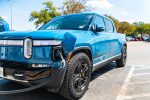
Rivian’s Latest Software Update Will Help Drivers Avoid Broken EV Chargers
Rivian is rolling out a fresh software update aimed at enhancing the charging experience for its electric vehicle (EV) customers. The update aims to provide users with better guidance on which EV chargers to utilize and which to steer clear of, addressing a persistent concern among plug-in vehicle owners regarding charging reliability. To achieve this, Rivian is leveraging its vehicle fleet to collect data on malfunctioning chargers, which are subsequently deprioritized in the company’s software algorithm.
Wassym Bensaid, Rivian’s head of software, emphasizes the company’s commitment to ensuring seamless charging and trip planning for EV drivers, minimizing the need for them to worry about these aspects. The new software update was tested during a road trip in an R1S SUV, revealing a grading system for chargers ranging from “A” for excellent condition to “F” for chargers experiencing issues.
This grading system is fueled by data collected from Rivian’s customers, with each vehicle transmitting data back to the company’s headquarters. Various metrics are assessed, including the number of successful charging sessions, payment reliability, interaction speed, and overall performance. This data is then processed to provide an accurate evaluation of each charger’s health, aiding Rivian in recommending reliable charging stations to its customers.
Unlike most EV charging operators, Rivian is taking an active approach by gathering real-time information on charger reliability and uptime through its own vehicles. By doing so, the company aims to address the prevalent issue of charging reliability cited by many EV owners.
Rivian’s initiative involves gathering substantial data on EV charging performance over time, culminating in this latest software update. However, the company acknowledges the limitations of its approach, as it relies primarily on data from its own vehicles and thus cannot offer a comprehensive overview of charging infrastructure nationwide.
To further improve its system, Rivian plans to introduce a customer-based feedback mechanism in a future update, allowing vehicle owners to contribute their own evaluations alongside the algorithmic scoring process.
While the EV charging network in the US still faces challenges such as software glitches, maintenance issues, and environmental factors, Rivian is actively working to alleviate these concerns. By integrating access to Tesla’s Supercharger network and deploying its own DC fast chargers across the country, Rivian aims to make charging a more seamless experience for its customers, ultimately reducing barriers to EV adoption.

